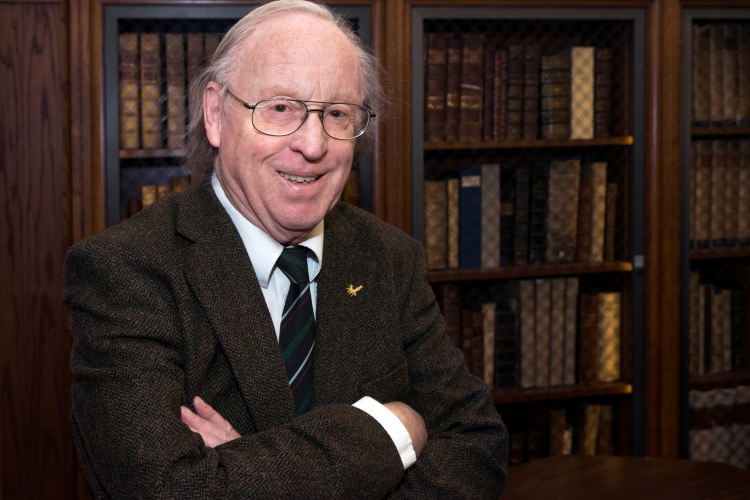
By
Terence Brown, the Burns Library Visiting Scholar in Irish Studies for the spring semester, has cultivated an accomplished career as a teacher, researcher and writer on Irish poetry, literature and culture. The Belfast native joined the Trinity College Dublin faculty in 1968, served as its dean of arts and humanities, and is currently a fellow emeritus. His published works include the widely acclaimed 1981 book Ireland: A Social and Cultural History, 1922-79, which has since been released in two updated editions, the last in 2004. [More biographical details on Brown are available at http://bit.ly/1eB4elB]
What interested you in accepting the Burns Scholar position? Did you have any prior connection to, or impression of, Boston College?
I had taught students from Boston College who were studying at Trinity, and I found them to be very well-trained and scholarly. So my image of BC was that of a very impressive institution. When the invitation to be the Burns Scholar came, I felt a sense of honor and privilege to teach and do research at such a well-known American university.
What are your main activities as Burns Scholar?
I am using the Burns Irish Book and Manuscript Collection to write an essay on William Butler Yeats’ drama – there are some very good resources there. And I am leading a seminar on the poetry of Yeats, Louis MacNeice and Seamus Heaney; we are looking at how their views of the Irish poets evolved over the years, and how different aesthetics affected their own poetry.
How well did you know Heaney?
I still feel a sense of loss and grief over his death. He was constantly a presence as a friend and encourager. He added a great enrichment to my life.
Where did your interest in poetry originate? Did you ever have a desire to write poetry yourself?
I think my inspiration came from attending Trinity and listening to Brendan Kennelly [who served as Burns Scholar in the fall of 2007] talk about poetry. Like most people, I suppose, I’ve had a try at writing poetry. But I realized early on I just didn’t have the talent of others who were successful at it. I thought prose was what I should write.
Talk about what led you to write Ireland: A Social and Cultural History.
You could call it an act of exploration. The book was an effort to understand, as someone from Northern Ireland, the country in which I’d made my life. I wanted to look at how Ireland became Ireland in the years following the 1922 treaty, taking into consideration the impact of nationalism, industrialism, religion, language revival and censorship, as well as literary and artistic aspects.
You’ve since published two editions of the book. What went into the process of updating and revising the original?
The 2004 edition covers the 1990s, which is a very important decade for Ireland. Obviously there was the economy – the beginnings of the so-called “Celtic Tiger” – and the Good Friday Agreement, but there were also the Catholic Church scandals. There was a real shaking of the foundations in many ways, so I did a fair bit of work on that.
When you look at the current generation of young Irish poets, do you see any who might have a similar impact as a Heaney or a MacNeice?
There are certainly good poets, like Sinead Morrissey, for example, but with the end of the conflict in Northern Ireland, the whole culture of Ireland has changed. The influence that the conflict had on people’s lives, and on the way they expressed themselves, is gone. The context is just different now, and to imagine someone like a Seamus Heaney emerging from it is difficult.
Now that you’ve been here for several weeks, what other impressions of Boston College have you formed?
I appreciate the lovely architecture of the campus; it’s a very well-built place. People have been very welcoming and helpful to me, especially [Associate Professor] Jim Smith and [Adjunct Associate Professor] Joe Nugent in the English Department.
I had the opportunity to read a book put out by BC’s Center for Ignatian Spirituality that emphasizes the University’s humanist/religious character, and I was very impressed. In Ireland, most third-level universities are associated with entrepreneurship or corporatism, with the mission to “serve the economy.” So it was refreshing to see a university produce a publication that extols the idea of creating educated, humane citizens.
What about Boston itself? Have you had the opportunity to explore the city?
Unfortunately, I have been restricted by all this appalling weather. I’m not unfamiliar with New England in the winter, because some years ago I was a visiting professor at the University of Vermont. But it did not feel as bad as this. And I was younger then.
Still, if winter comes, can spring be far behind?
Terence Brown will present the lecture “Amazing Grace: Evangelicalism & Ulster Literature” on April 3 at 4:30 p.m. in the Burns Library Thompson Room. The event, sponsored by the Center for Irish Programs and Burns Library, is free and open to the public.



